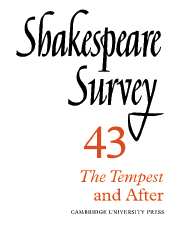Book contents
- Frontmatter
- The Power of Magic: From Endimion to The Tempest
- Reading The Tempest
- The Latter End of Prospero’s Commonwealth
- Henry VIII and the Deconstruction of History
- The Politics of Conscience in All is True (or Henry VIII)
- Shakespeare’s Romantic Innocents and the Misappropriation of the Romance Past: The Case of The Two Noble Kinsmen
- The Hand of John Fletcher in Double Falsehood
- ‘The Duke my Father’s Wrack’: The Innocence of the Restoration Tempest
- ‘Remember/First to Possess his Books’: The Appropriation of The Tempest 1700-1800
- The Tempest and After
- Poetry’s Sea-Changes: T. S. Eliot and The Tempest
- The New Function of Language in Shakespeare’s Pericles: Oath versus ‘Holy Word’
- The Discovery of The Rose Theatre: Some Implications
- The Origins of the Roxana and Messallina Illustrations
- Recycling the Early Histories: ‘The Wars of the Roses’ and ‘The Plantagenets’
- Shakespeare Production in England in 1989
- Professional Shakespeare Productions in the British Isles, January-December 1988
- The Year's Contributions to Shakespeare Studies: 1 Critical Studies
- 2 Shakespeare’s Life, Times, and Stage
- 3 Editions and Textual Studies
- Books Received
- Index
Henry VIII and the Deconstruction of History
Published online by Cambridge University Press: 28 March 2007
- Frontmatter
- The Power of Magic: From Endimion to The Tempest
- Reading The Tempest
- The Latter End of Prospero’s Commonwealth
- Henry VIII and the Deconstruction of History
- The Politics of Conscience in All is True (or Henry VIII)
- Shakespeare’s Romantic Innocents and the Misappropriation of the Romance Past: The Case of The Two Noble Kinsmen
- The Hand of John Fletcher in Double Falsehood
- ‘The Duke my Father’s Wrack’: The Innocence of the Restoration Tempest
- ‘Remember/First to Possess his Books’: The Appropriation of The Tempest 1700-1800
- The Tempest and After
- Poetry’s Sea-Changes: T. S. Eliot and The Tempest
- The New Function of Language in Shakespeare’s Pericles: Oath versus ‘Holy Word’
- The Discovery of The Rose Theatre: Some Implications
- The Origins of the Roxana and Messallina Illustrations
- Recycling the Early Histories: ‘The Wars of the Roses’ and ‘The Plantagenets’
- Shakespeare Production in England in 1989
- Professional Shakespeare Productions in the British Isles, January-December 1988
- The Year's Contributions to Shakespeare Studies: 1 Critical Studies
- 2 Shakespeare’s Life, Times, and Stage
- 3 Editions and Textual Studies
- Books Received
- Index
Summary
Two preliminary problems impose themselves at the outset of any study of Henry VIII. In both cases, the issues raised may in a narrow sense be dispatched rather quickly, though their wider ramifications continue to bear on our reading of the play.
The first problem, of course, is that of authorship, which has bedevilled criticism ever since Spedding, in 1850, attempted to substantiate Tennyson's intuition that the play was written by Shakespeare in collaboration with Fletcher. The burden of proof that necessarily rests with those who would follow Spedding is augmented by the fact that this hypothesis is unsupported by any external evidence. Indeed, since the surviving ballad concerning the burning of the Globe theatre in 1613 records that Heminges and Condell were both present at the fateful performance of Henry VIII, their inclusion of the play in the First Folio ten years later must have taken place with full knowledge of the circumstances of its composition and hence provides a measure of tangible evidence that it is not a collaboration. Strikingly, both Pericles and The Two Noble Kinsmen, the two other plays in the Shakespearian canon most often thought to have been written by more than one hand (the latter on the incontrovertible basis of the title page of the 1634 quarto and an 8 April 1634 entry in the Stationers' Register, both of which ascribe the play to Shakespeare and Fletcher), do not appear in the Folio, whereas the Hecate scenes in Macbeth, which might be cited as a counterexample, are a case of circumscribed interpolations rather than of an entire play written by Shakespeare jointly with a second playwright.
- Type
- Chapter
- Information
- Shakespeare Survey , pp. 43 - 58Publisher: Cambridge University PressPrint publication year: 1991
- 5
- Cited by

